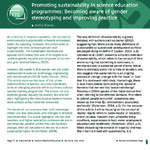Promoting sustainability in science education programmes: becoming aware of gender stereotyping and improving practice
| dc.contributor.author | Davis, K | |
| dc.date.accessioned | 2016-07-04T10:35:45Z | |
| dc.date.available | 2016-07-04T10:35:45Z | |
| dc.date.issued | 2016-07-01 | |
| dc.identifier.issn | 1756-915X | |
| dc.identifier.uri | http://hdl.handle.net/10026.1/5016 | |
| dc.description.abstract |
As a lecturer in science education, the concept of environmental sustainability is heavily embedded within my teaching. However, this article aims to highlight the links between gender and sustainability. The sustainable development agenda 2030 states that one of its targets is to ‘achieve gender equality and empower all women and girls’ (United Nations, 2015). However, the reality is that women are still under-represented in science, technology, engineering and mathematical (STEM) fields (Penner, 2015). This article explores the issue of this under-representation of women, and also specifically looks at changing practice within a primary science teacher training programme. The article not only explores gender equality for women, but also for men, highlighting the stereotypical barriers trainee male primary school teachers encounter. The issues of ‘unconscious bias’ and ‘stereotype threat’ are also discussed and changes in practice recommended. The article highlights the fact that teachers and higher education professionals are in the fortunate position where they can facilitate change; after all, education is the key to a more sustainable future for all (Nevin, 2008). | |
| dc.language.iso | en | |
| dc.publisher | The Association for Science Education | |
| dc.subject | Gender | |
| dc.subject | Science | |
| dc.subject | Sustainability | |
| dc.subject | STEM | |
| dc.subject | ITE | |
| dc.subject | Primary | |
| dc.subject | Teaching | |
| dc.subject | Higher Education | |
| dc.subject | Stereotypes | |
| dc.subject | Bias | |
| dc.subject | Unconscious Bias | |
| dc.subject | Stereotyping | |
| dc.title | Promoting sustainability in science education programmes: becoming aware of gender stereotyping and improving practice | |
| dc.type | journal-article | |
| plymouth.issue | July 2016 | |
| plymouth.volume | No 76 | |
| plymouth.publication-status | Published | |
| plymouth.journal | Science Teacher Education | |
| plymouth.organisational-group | /Plymouth | |
| plymouth.organisational-group | /Plymouth/Faculty of Arts, Humanities and Business | |
| plymouth.organisational-group | /Plymouth/Users by role | |
| plymouth.organisational-group | /Plymouth/Users by role/Academics | |
| dcterms.dateAccepted | 2016-06-24 | |
| dc.rights.embargoperiod | No embargo | |
| rioxxterms.licenseref.uri | http://www.rioxx.net/licenses/all-rights-reserved | |
| rioxxterms.licenseref.startdate | 2016-07-01 | |
| rioxxterms.type | Journal Article/Review |


